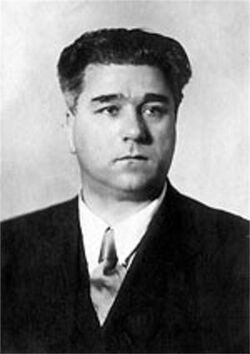More languages
More actions
Valko Chervenkov Вълко Вельов Червенков | |
|---|---|
 | |
| Born | September 6, 1900 Zlatitsa, Principality of Bulgaria |
| Died | October 21, 1980 (aged 80) Sofia, People's Republic of Bulgaria |
| Nationality | Bulgarian |
| Political orientation | Marxism-Leninism |
| Political party | Bulgarian Communist Party |
Valko Velyov Chervenkov was a Bulgarian Marxist-Leninist revolutionary and statesman. He was the General Secretary of the Central Committee of the Bulgarian Communist Party between 1949 and 1954 and Prime Minister of Bulgaria between 1950 and 1956. He was denounced by revisionists within the party following the start of De-Stalinization, and resigned in 1956.
Early Life[edit | edit source]
Pre-WW2 Revolutionary Life[edit | edit source]
Chervenkov's political career started at the age of 14, when he helped lead a great student strike in Sofia. He joined the Bulgarian Communist Party as soon as it was formed at the age of 19, and three years later was seriously wounded in a clash with Tsankoff Fascists in the outskirts of Sofia.
At the time of the Tsankoff coup d'etat in June, 1923, Chervenkov was secretary of the Young Communist League in Sofia, and as leader of the Komsomols he took part in the September insurrection. After the revolt was suppressed he remained illegally in Bulgaria and was sentenced to death in absentia. Due to his bulk and striking physical characteristics, it was not an easy thing for Chervenkov to go underground. Time and again he escaped capture by a hair's-breadth. In the two years between the 1923 revolt and the 1925 attentat in the Sofia Cathedral, he was constantly on the run. He played an important role in rebuilding the Communist Party machine, but following the wholesale massacre of Communists in 1925, he was ordered by the Central Committee to leave the country. He left illegally for Moscow and studied at Moscow University. A striking tribute to his abilities was his appointment as a director of the Marx-Lenin Institute in Moscow, where many of Europe's leading Communists passed through his hands.[1]
World War 2[edit | edit source]
He was naturally in closest contact with Dimitrov and Kolarov during his exile and he was in charge of educating all Bulgarian political exiles in the Soviet Union. When war broke out, he was put in charge of the Bulgarian language, Christo Botev Radio Station.[1]
People's Republic of Bulgaria[edit | edit source]
He returned to Sofia with the Medal of Lenin, one of the highest Soviet decorations, and was immediately made a member of the Politburo of the Bulgarian Communist Party. In the first Dimitrov Cabinet, he was president of the Committee for Science, Arts and Culture, as well as Secretary-General of the Fatherland Front, and a secretary of the Central Committee of the Communist Party. After Dimitrov's death, Chervenkov became first vice-premier and secretary-general of the Communist Party and after Kolarov died, he became Prime Minister.[1]
Under Chervenkov, the building of socialism continued, with achievements especially in the field of industrialization.
In 1956, the revisionists, strengthened by Khrushchev's De-Stalinization, denounced Chervenkov, leading to his resignation.
He died in 1980 in Sofia.
References[edit | edit source]
- ↑ 1.0 1.1 1.2 Wilfred G. Burchett (1951). People's Democracies: 'The life of Georgi Dimitrov, Part II'.
